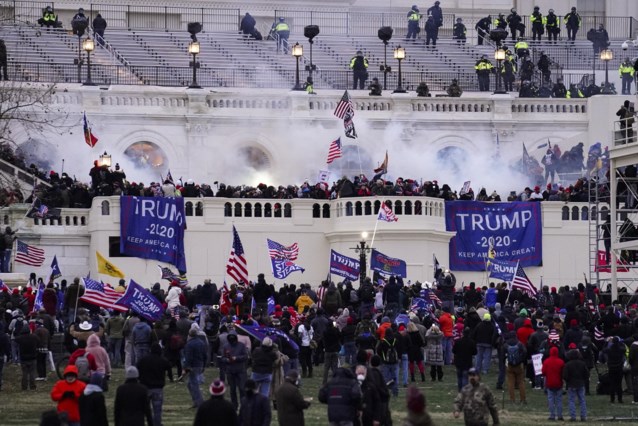The Supreme Court on Friday recused prosecutors in the files surrounding the storming of the Capitol on January 6, 2021. They ruled that prosecutors went too far in their use of an obstruction law in those cases.
The law in question was passed in 2002 in response to the financial scandal that brought down the energy company Enron. But according to the judges, that law is not applicable to many in this scenario. According to them, the obstruction law was only intended to apply in more limited circumstances. For example, there must be evidence of tampering with evidence. The judges therefore ruled, by a vote of 6 to 3, that such a charge of obstruction must include evidence that defendants attempted to tamper with or destroy documents. The broad range of situations for which the prosecutors now tried to use the law is therefore not included.
Former police officer
The Supreme Court’s decision stems from the conviction of Joseph Fischer, a former Pennsylvania police officer who participated in the so-called “Stop the Steal” rally on the morning of Jan. 6 before storming and entering the Capitol.
Fischer was one of about 350 people charged by federal prosecutors under the law in question, which says anyone who “otherwise obstructs, influences, or impedes an official proceeding, or attempts to do so” could be fined or punishable by up to 20 years in prison. Fischer challenged his conviction, ultimately bringing his case to the Supreme Court.
27 suspects in jail
The Supreme Court’s ruling means only some who violently invaded the Capitol in 2021 will be included in that charge. According to NBC News, of the more than 1,400 cases involving the storming of the Capitol, 247 are affected by the Supreme Court’s ruling. Although there are only 52 cases in which that obstruction charge was the only charge. And only 27 of those suspects are currently serving a sentence.
Importantly, the Supreme Court also made clear that rioters can still be charged under the obstruction law if prosecutors can prove that the suspects not only attempted to enter the building, but also attempted to prevent the arrival of specific certificates. These certificates are used to count votes and thus determine the election results.
Donald Trump
Former President Donald Trump must also answer in court for the facts that happened on January 6. He is being prosecuted for his efforts to nullify the 2020 presidential election. Trump faces four charges in that case, two of which relate to obstruction of official proceedings.
But according to analysts in the American media, the new Supreme Court ruling does not mean that the obstruction charge against Trump should be dropped. Analysts say prosecutors still have strong arguments they can use to uphold the obstruction charge. Namely that Trump was involved in a conspiracy to thwart the certification of the votes by Congress by having counterfeit ballots introduced from “fake” electors.

Kelebihan Parisslot: Situs Slot Online Terbaik
사이트를 이용하여 쉽게 돈을 벌 수 있습니까? – 소파 오페라
Corporate Video Production | Science & technology – All Your Digital Needs
heaving's shop on Spoonflower: fabric, wallpaper and home decor
HAVEING12 (u/Budget-Party-9031) – Reddit
patriciaquintana – HAGI Academy
jonesmuller456293399 | Brusheezy
stephanielester – Pengguna – Portal Data Pemerintah Kota Batu
Topfuneralmarketingg – Quora
Activité – À Vous La Parole !
jons heaving | Elastic Community Events
Kaleidas
World Travel server merchant portal
juanitajones juanitajones's Profile Page
Profile – topfuneralmarketing – MyArticles
kitchen9's Shows | Mixcloud
joker123motobol’s profile • Letterboxd
User malestamp76 – Minecraft Command Science
Certificate verification problem detected
Certificate verification problem detected
User Profile
mammothicfilms – Software – Local Business
Mammothic films – Breezio – Collaborative Research Platform
Delphi Forums Member Profiles
mammothic Profile | AngryBirdsNest User Profile
heaving dull · GitLab
스포츠 경기 시스템으로 많은 것을 얻고 97%의 놀라운 비율을 얻습니다 – 리뷰 – 한국토끼정보블로그
Spain's Gun Laws 2024: What US Citizens Need To Know – INSCMagazine
NawaksaraProfile: jeffryfowler – » Forum
Beyond Boundaries: Non Gamstop Casinos' Game Diversity